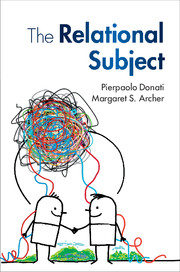Book contents
- Frontmatter
- Dedication
- Contents
- List of figures
- Acknowledgements
- Part I
- Part II
- Part III
- Prologue: The range of Relational Subjects: where and how they emerge
- 6 When Relational Subjects generate relational goods
- 7 The emergence of collective Relational Subjects and their societal impact: beyond the market/state binary code
- 8 Relational Subjects and the ravages of globalized markets: the need for subjects with relational ethics
- 9 Conclusions: Collective subjects and the added value of social relations
- Index
6 - When Relational Subjects generate relational goods
from Part III
Published online by Cambridge University Press: 05 July 2015
- Frontmatter
- Dedication
- Contents
- List of figures
- Acknowledgements
- Part I
- Part II
- Part III
- Prologue: The range of Relational Subjects: where and how they emerge
- 6 When Relational Subjects generate relational goods
- 7 The emergence of collective Relational Subjects and their societal impact: beyond the market/state binary code
- 8 Relational Subjects and the ravages of globalized markets: the need for subjects with relational ethics
- 9 Conclusions: Collective subjects and the added value of social relations
- Index
Summary
In search of ‘other goods’ that confer solidity on a robust democratic civil society
For some years now the social sciences have highlighted the existence of a type of goods that are neither material things, nor ideas, nor functional performances but consist, instead, of social relations and, for this reason, are called relational goods.
This chapter proposes, first of all, to clarify this concept and, subsequently, to show that such goods can be produced only by specific social subjects, which we call ‘Relational Subjects’. We shall then see in which sense and in which way Relational Subjects, and the goods they generate, can contribute to making civil society more robust: that is, no longer the typically modern civil society – the bourgeois society of the market – but an ‘associational’ society able to sustain a mature democracy as a welfare society's form of governance.
It is important to emphasize from the beginning that the type of goods that we call relational cannot be traced back to traditional or premodern forms of social organization, because they require conditions that only modernity has created by making individuals more free and guaranteeing a considerable amount of social mobility. For a long time these goods have been dismissed or even repressed by capitalistic society as well as by societies dominated by dictatorships. Today they are emerging as the yeast of an advanced democracy. They are created precisely where relations between consociates are tendentially symmetrical (not hierarchical), free, and responsible (not constrained by authoritative norms or powers), not mercantile, in the sense of being dictated by the pursuit of individual profit.
Empirical studies show how widespread they really are. These are goods that are invisible to the naked eye (they are intangible goods) and are continually sought by people, but they come into existence only under particular conditions.
- Type
- Chapter
- Information
- The Relational Subject , pp. 198 - 228Publisher: Cambridge University PressPrint publication year: 2015
- 3
- Cited by

